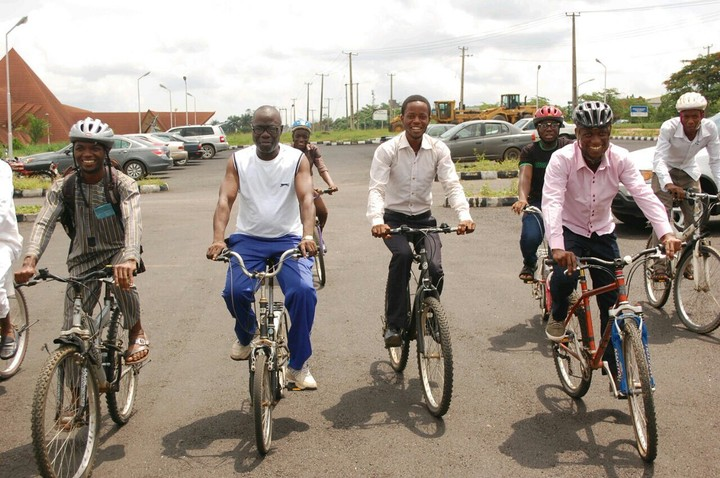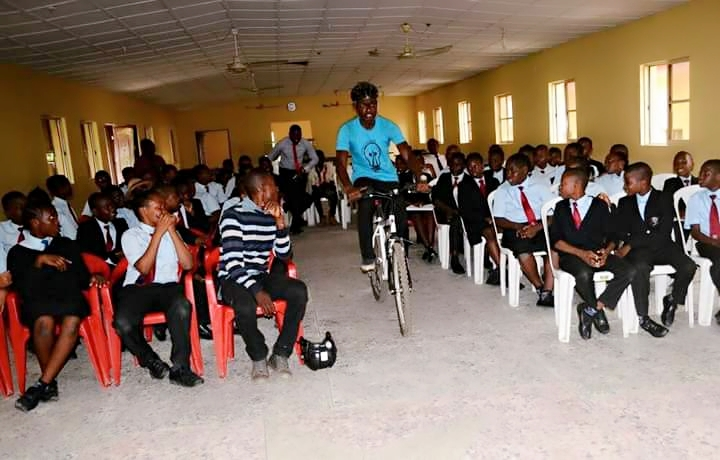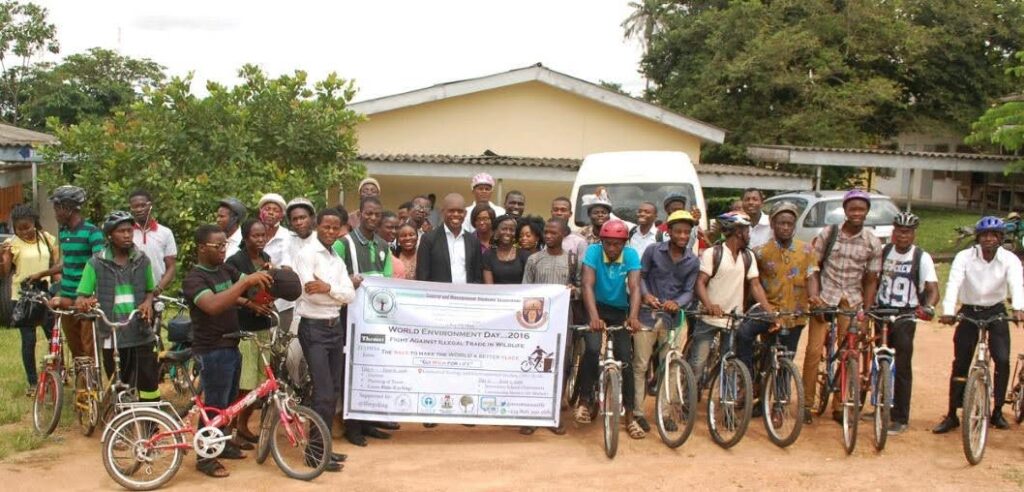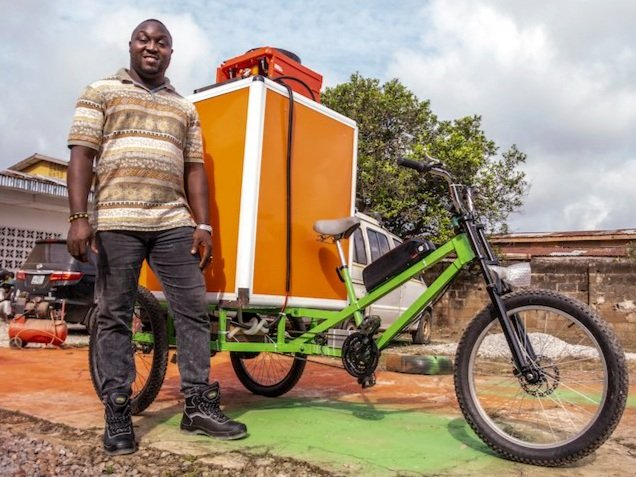
Phillip Ayetigbo

Phillip Ayetigbo
One time when I was a child, I waited for weeks, hoping to see my father arrive and lead us to the annual Christmas gathering. After some time, he still had not come and we were getting sick of waiting.
But all of a sudden, my friends glimpsed him from afar and one of them ran inside to notify me of my father’s long awaited arrival. I rushed outside watching him come closer and closer. He was not walking or driving, but riding on a strange device.
My old man was riding on a bicycle wearing a beautiful smile. I’m sure he expected me to return the smile but I became disappointed the more he drew closer, so I turned my back. I went inside the house with my head hanging down.
I had suffered disappointment because I saw my father on a bicycle when virtually all the other fathers on my street had by that time switched to cars.
For a long time, bicycles had been a popular form of transportation for people of all classes in Nigeria. Then in the early 1990s, the mentality shared by most people in my community changed to prefer cars over bicycles, relegating them to be considered only suitable for the poor and lower class.
The use of bicycles in Nigeria has been drastically reduced over the years in the name of development, notably since the beginning of the 4th Republic. This period of economic and political reform in Nigeria started in 1999 and initiated many market reforms.
These days, almost everyone prefers motorcycles for both close and long distance trips. Car ownership has even turned into competition, with many seeing cars as a status symbol.
According to O.J. Matthew, a Research Fellow in the Institute of Ecology and Environmental Studies, Obafemi Awolowo University Nigeria, “Carbon dioxide and other notable greenhouse gases, such as methane, tropospheric ozone, and halogen gases, are known to produce a warming effect that triggers climate change.” Individuals have some control over greenhouse gas emissions as, “one of the leading sources of carbon emissions to the atmosphere is transportation. Therefore, choosing to always ride a bicycle over a few car trips, as your transportation habits, could significantly help to protect the environment from climate change impacts,” Matthew said.
Unfortunately, according to CEIC Data Global Database, vehicle registrations rose nationally in Nigeria from 3,750 in 2015 to 11,605 in 2020.
In my neighborhood, it is not uncommon to see a family of five with five different cars parked in their compound.
The tendency of people in my country to prefer cars over bicycles seems to be a result of a lack of education.
In order to address this, I shared a vision back in 2016 to increase education and familiarity with the role of bicycles on the environment.
This was aimed at people in my locality and I took every opportunity possible to start teaching people how to ride bicycles. At the time, I was the President of Environmental Control and Management Students’ Association (ECOMSA) in my school which led me to meet an organization of young people called ‘Life Fitness Cycling Club’ (LFCC). We struck a deal by subtly reintroducing cycling to the people and massively campaigning for bicycle riding in the society using social media and in-person meetings.
I led ECOMSA to push the concept of bicycle riding harder during the commemoration of World Environment Day 2016 held in Obafemi Awolowo University Ile-Ife Nigeria in collaboration with Life Fitness Cycling Club which recorded approximately 100 participants while thousands watched our activities online.
Our group planted trees and rode bicycles around the schools and community to raise awareness for the environment.


Shortly after, we noticed an increase in the number of cyclists on campus as lecturers were coming to the school on bicycles.
Prior to the event, I had secured another collaboration with Nigerian Conservation Foundation (NCF) in Lagos and Nigerian Television Authority (NTA), in which the NTA used their media platform to project our activities to Nigerians all over the country.
The broadcast actually worked as our activities during World Environment Day 2016 went viral and appeared on more than 37 blogs.
These days, biking technology is rapidly changing with electric bikes growing in popularity around the world.
Tolulope Olukokun, the founder of ThinkBikes, an electric bike store in Ibadan, Oyo State Nigeria, is a proponent of biking as a way to mitigate carbon emissions in Nigeria.
“Crafting sustainable solutions has been a passion, and the electric bicycle emerged from a deep commitment to address environmental challenges,” Olukokun said.
The primary motivation was to provide affordable and eco-friendly transportation in Africa. Recognizing the impact of traditional transportation on the environment, the vision was to introduce an electric bicycle that aligns with the continent’s needs for efficient, cost-effective, and sustainable mobility.
The reception has been promising. Olukokun says that people appreciate the accessibility and environmental benefits. According to the business man, we have witnessed a growing enthusiasm for electric bicycles, especially among urban commuters and environmentally conscious individuals.
His electric bicycles contribute significantly to reducing carbon emissions, according to Olukokun. By replacing traditional fuel-dependent modes of transport, they’ve estimated a substantial decrease in the business’s carbon footprint.
This aligns with global efforts to combat climate change by promoting cleaner transportation alternatives. Challenges, while inevitable, have mainly revolved around infrastructure and awareness. Electric bicycles are relatively new in many regions, and establishing the necessary charging stations has been a hurdle. Additionally, fostering awareness about the benefits of electric bicycles requires concerted efforts.
In the coming years, ThinkBikes plans to expand its footprint across Africa. With an increasing focus on sustainability, Olukokun aims to establish partnerships, enhance infrastructure, and promote policies supporting electric mobility. “We see ThinkBikes as a catalyst for change, influencing not only transportation habits but contributing to a broader shift toward a greener and more sustainable future,” Olukokun said.

Ironically, I’m now the one who wishes to see my father ride on a bicycle so that I could encourage him with a warming smile, and he is now the one who prefers a car for mobility.
Now that I am educated on the climate impacts of cars, I regret the reaction I had as a child. I hope my story serves as a clue to what is going on across different communities in terms of the perception toward bicycles as a means of transportation.
Education and sensitization are important aspects of promoting green modes of transportation and should be promoted in Nigeria especially in rural and urban communities.